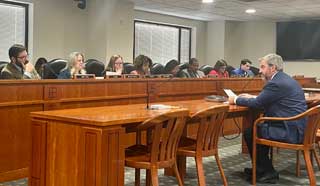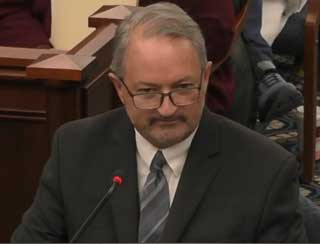Lansing Update: MCC Champions Historic Tax Cut for Working Poor Into Law
Posted March 10, 2023
In this update:
- A Brief Rundown on 5 MCC Issues That Saw Legislative Action This Week
- MCC Celebrates Historic Tax Cut for Working Poor Signed into Law
- Religious Organizations Could be Targeted after Legislature Approves Civil Rights Bill
- Penalty for Killing Woman During Abortion Removed in Legislation Going to Governor's Desk
- Gun Safety Reforms Move Forward in House, Senate with MCC Support
- Senate Approves Bill to Ease Access to Food Assistance for Those in Need
A Brief Rundown on 5 MCC Issues That Saw Legislative Action This Week
It was another busy week at the state Capitol, with five issues Michigan Catholic Conference (MCC) is involved with all seeing action. Here’s a quick summary before more detail is provided in the articles below:
- A significant MCC priority for helping the working poor—expanding the state Earned Income Tax Credit to 30 percent—was signed into law by the Governor.
- The Legislature sent an expanded state civil rights bill to the Governor without religious protections language that MCC and others has been calling for. The bill has not been signed yet, but the Governor’s support is likely.
- The Governor also was sent legislation to remove the 15-year felony for killing a woman during an abortion and could leave a gap in state law for regulating late-term abortions. The bills have not been signed yet, but the Governor’s support is likely.
- Gun safety reforms that MCC supports advanced in both the House and Senate. The House has approved one of the three major policy changes under consideration, while a Senate committee has advanced bills that implement all three gun reform policies.
- An MCC-backed policy making it easier for the poor to qualify for food assistance was approved by the Senate this week and heads to the House next.
MCC Celebrates Historic Tax Cut for Working Poor Signed into Law
A significant tax break for lower income working families has become law after Gov. Gretchen Whitmer signed this week a bipartisan effort to increase the state’s Earned Income Tax Credit (EITC).
MCC along with hundreds of statewide organizations had championed the cause this and the previous legislative session to increase the state EITC from 6 percent of the federal credit to 30 percent.
What this means is that a family of four with $37,500 of earned income could claim $999 in a tax refund under the expanded EITC, up from a refund of $200 at the current rate, for example.
And between the federal and state EITC, the more than 750,000 eligible Michigan families on average could see as much as $3,000 returned to their pockets at tax time.

MCC has supported the state EITC because it is a proven path out of poverty and upholds the dignity of work. MCC has supported it since its inception in 2006 at 20 percent of the federal credit. MCC worked to convince lawmakers to save it during budget cuts in 2011 but it was reduced to 6 percent.
Momentum behind expanding the EITC began to build with the state sitting on an unprecedented amount of surplus funds and the need to help working families with the increased costs of inflation more urgent than ever. MCC was among the principal leaders in a coalition that eventually grew to more than 230 groups from around the state urging an increase to the EITC.
“Michigan’s hardworking families will finally get the economic relief they deserve,” said Tom Hickson, vice president of public policy at MCC, in a press release issued after the Governor signed the bill. “Expansion of the EITC is a pro-family, pro-children policy that provides a level of stability and assistance to help less affluent families get by and cover the cost of basic necessities that many families struggle to afford.”
Members of the Catholic Advocacy Network (CAN) like you played a role in enacting this EITC increase by sending more than 1,200 messages to lawmakers and the Governor since 2022. Thank you for all who participated and made their voices heard on this important policy that will now become real improvement in the lives of Michigan families.
However, there is continued need for advocacy to ensure families can take advantage of the expanded credit as soon as possible. While the bill was signed into law this week, it will not take effect until March 2024, meaning people who qualify for it now won’t get that additional support until March 2024 at the earliest.
This happened because the EITC expansion policy got wrapped into a broader tax relief bill—House Bill 4001, sponsored by Rep. Angela Witwer (D-Delta Twp.)—that passed the Legislature, but without enough votes to take effect immediately.
Discussions are underway to introduce and advance a follow-up bill to ensure the EITC policy takes effect immediately, because the EITC policy by itself has enough support from both Republicans and Democrats to get the votes needed to take effect immediately.
MCC will keep you informed on opportunities to advocate for ensuring the newly expanded EITC relief can be made available to working families who need it now.
Religious Organizations Could be Targeted after Legislature Approves Civil Rights Bill
Despite continued MCC and grassroots Catholic advocacy, the Legislature sent civil rights legislation to the Governor for her likely signature without protections against discrimination and liability for religious organizations.
This week, a House committee and then the full House voted to approve Senate Bill 4, which amends the Elliott-Larsen Civil Rights Act (ELCRA) to prohibit discrimination based on sexual orientation and gender identity. The bill has already cleared the full Senate.

In a statement issued after the House vote, MCC argued that the legislation, because it did not include religious protections, will likely create a right to target religious organizations for their teachings, beliefs, and practices related to traditional marriage and biological gender differences.
MCC provided language for an amendment to Senate Bill 4, sponsored by Sen. Jeremy Moss (D-Southfield), that would have protected religious organizations, but MCC’s amendment was never formally offered for consideration in either the House or the Senate.
“Today, a majority of the Michigan House voted to intentionally deny essential protections for religious institutions in the state’s civil rights code. As a result, discrimination and targeted litigation toward faith-based institutions is highly likely,” said Tom Hickson, MCC’s vice president for public policy and advocacy, in a statement after the vote. “We are disappointed that the House did not include language to protect religious organizations from discrimination even though every state in the country has done so when amending their civil rights laws.”
Hickson, who testified before House and Senate committees to share MCC’s perspective, added that “we believe it is necessary to state that this policy fails to protect all citizens from discrimination and will likely prompt greater scrutiny through the lens of the First Amendment.”
MCC was joined in its advocacy by the Council on American-Islamic Relations Michigan Chapter and Citizens for Traditional Values in encouraging legislators to protect from discrimination those who teach and believe that marriage is between one man and one woman, and that men and women are biologically different from one another. MCC staff also engaged in numerous media interviews publicizing its concerns about the legislation.
More than 8,000 messages were sent to lawmakers from members of the Catholic Advocacy Network (CAN) like you encouraging support for religious protections. MCC is extremely grateful for the immense amount of grassroots engagement in a campaign that saw the most engagement of any such campaign initiated in the history of MCC.
While this effort did not result in a religious liberty amendment, it impacted the discussions MCC staff had with lawmakers regarding the legislation and elevated the issue to a point that cannot be ignored moving forward.
The campaign also resulted in the addition of more than 3,000 new members to the CAN, which will strengthen the voice of MCC and Catholic advocacy for future campaigns.
Penalty for Killing Women During Abortion Removed in Bills Going to Governor’s Desk
MCC remains concerned about bills approved by the Legislature that remove penalties from state law for people who kill a woman in the process of an abortion.
The provision removing that safeguard for women is contained within a legislative package seeking to repeal Michigan’s long-standing law prohibiting abortion except to save the mother’s life.
MCC last week testified before a Senate committee that the law may still impact abortions conducted post-viability and should be retained.
The new constitutional amendment approved by voters in November allows the Legislature to regulate abortions post-viability, and it’s been argued by MCC and other pro-life organizations that the current law on the books prohibiting abortion could apply in limited circumstances.
Other legislation in the package repeals penalties for anyone who kills a woman during an abortion, which under current law is a felony punishable up to 15 years in prison.
The bills under consideration are House Bills 4006 and 4032, as well as Senate Bills 2, 37, 39, and 93. The state Senate this week voted to approve all those bills on party-line votes with Republicans opposed and Democrats in favor.
Senate Republicans tried to amend the legislation by tying it to bills they sponsored that are intended to ensure common-sense safeguards around the practice of abortion.
Those safeguard bills included prohibiting abortion because the baby has been found to have Down’s syndrome, and providing penalties for someone who fails to render medical care to a baby born alive following an abortion. Additional measures proposed by Republicans would have protected pregnancy resource centers and allowed pharmacists to refuse to dispense abortion drugs.
However, the Democrats rejected those amendments, as they did when Republicans in the House tried to offer some similar amendments.
The state House last week approved the House bills, meaning the House bills are now on the Governor’s desk for her consideration. The Senate bills have been sent to the House Judiciary Committee for further consideration.
Gun Safety Reforms Move Forward in House, Senate with MCC Support
MCC again shared its support of gun reforms that advanced in the House and Senate this week, while reminding lawmakers that enacting gun safety measures will not address all factors that impact violence in society.
Both the House and Senate are focused on advancing three distinct gun safety policies: Expanding background checks on gun purchases, requiring gun owners to lock their guns up at home, and implementing a process to temporarily remove guns from people who may pose a threat to themselves or others.

This week committees in the House and Senate took testimony on bills to implement those policies.
The House Judiciary Committee voted to advance the bills only pertaining to expanding background checks. Later that day, the full House voted to approve those bills—House Bills 4138, 4142 and 4143—on party-line votes with Democrats in favor and Republicans opposed.
In the Senate, a Senate committee voted to advance the entire package of bills covering the three policies—Senate Bills 76 through 86—to the full Senate for further consideration.
MCC testified in favor of the package in the Senate committee as well as in the House committee last week in recognition that gun violence destroys human lives, as MCC opposes violence of any kind, reiterating that the dignity of all persons must be respected from conception to natural death.
In its testimony, MCC said it supported the gun safety bills as “steps on a journey toward a culture that values life, recognizes and includes the isolated among us, and seeks to bring safety to our communities.”
Senate Approves Bill to Ease Access to Food Assistance for Those in Need
More people in need would qualify for food assistance under an MCC-backed bill that cleared the state Senate this week.
Senate Bill 35, sponsored by Sen. Jeff Irwin (D-Ann Arbor), would remove the requirement that a food assistance applicant has to pass an asset test to qualify for receiving food stamps. Currently, a food assistance recipient must show he or she has under a certain amount of assets to qualify for food, which includes resources like savings accounts.
The bill advanced from the Senate Housing and Human Services Committee last week and was approved by the full Senate on a bipartisan 25-13 vote.
MCC supports the bill in accordance with the Catholic social principle of providing preference for helping the poor, particularly when it comes to making sure people have enough to eat. The bill is now before the House Economic Development and Small Business Committee for further consideration.
